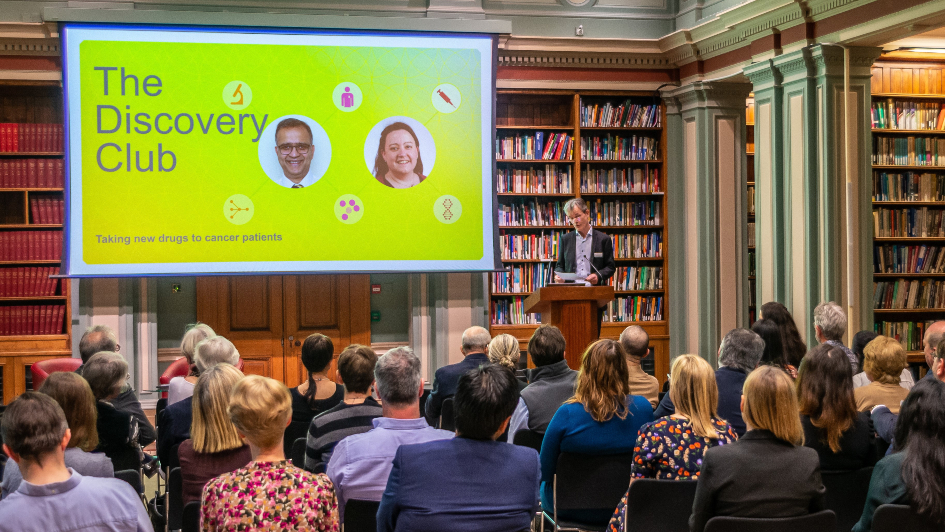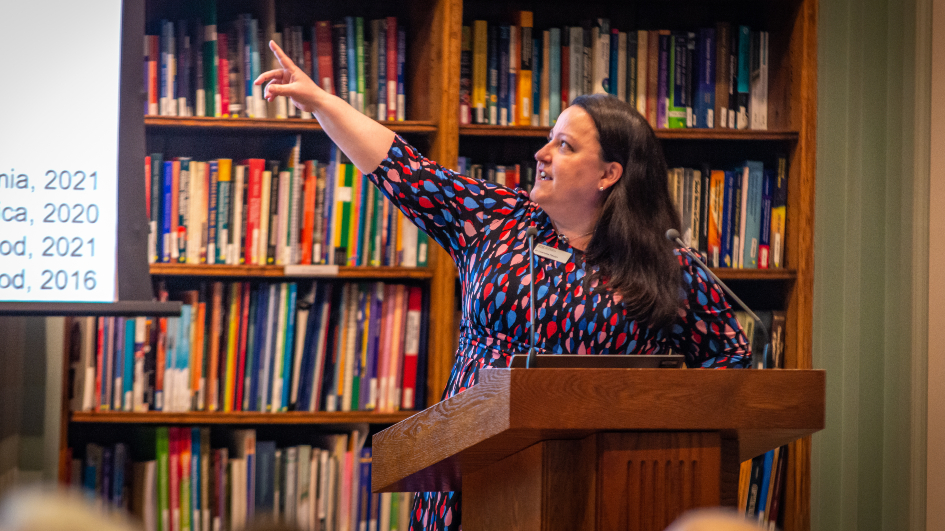
Image: Chief Executive Professor Kristian Helin opens the March Discovery Club: Taking new drugs to cancer patients. Credit: ICR / ProfotoDesign
Members of the Discovery Club gathered at the Royal Society of Chemistry to hear how our scientists are moving new cancer drugs into the clinic. They also explained how we take observations from patients back into the lab and then back again into the clinic to improve current treatments.
Our Chief Executive, Professor Kristian Helin, opened the event on 16 March by reflecting on our unrivalled track record in drug discovery.
Many of our discoveries already have a widespread impact such as abiraterone, which has prolonged the lives of thousands of men in the UK with advanced prostate cancer. Philanthropic support has been crucial to accelerating our discoveries to patients.
Guests then heard from Professor Udai Banerji and Dr Charlotte Pawlyn, who highlighted exciting areas of research, new clinical trials, and celebrated progress in delivering treatments to patients.
Developing transformative cancer drugs
Professor Udai Banerji is a Clinician Scientist, leading two ICR research teams, and is the Deputy Director of the Drug Development Unit at the ICR and The Royal Marsden. He focuses on taking the most promising new drugs into early phases of clinical testing, where patients receive the drug for the first time.
To bridge lab results to the clinic, scientists need to develop trials to demonstrate drugs are safe and effective for patients. For instance, monitoring how long the drug stays in the body helps to find the best dosage. Understanding the effects of the drug in the body allows trials to progress and show the drug is effective, and in which patients.
Professor Banerji shared several examples of drugs that are currently in development and how they prevent cancer by targeting different processes in tumour cells. These drugs can ‘switch off’ specific cancer-causing genes.
They can also stop cancer cells from moving and spreading to other parts of the body or mimic molecules that get taken up by cancer cells but are modified to deliver targeted chemotherapy to tumours. Our most recent drug discovery to enter clinical trials is NXP800, which will focus particularly on women with advanced ovarian cancers.
Reverse translation: From the lab to the clinic and back
Most drug development is focussed on forward translation – the process of taking new drugs into the clinic. In Dr Pawlyn’s presentation, she explained the importance of reverse translation and how it can help to make new discoveries to overcome drug resistance.
Dr Charlotte Pawlyn is a Clinician Scientist who has recently set up her Myeloma Biology and Therapeutics Team at the ICR. She is involved with several national studies in multiple myeloma, a cancer that forms in a type of white blood cell called a plasma cell.
Multiple myeloma is considered an ‘incurable’ cancer because it often comes back but developing effective and long-lasting treatments is key to helping patients with cancer live longer and better.
Her research focuses on patients who have become resistant to immunomodulatory drugs. It has only recently been understood how these drugs work, both directly on the myeloma cells and to alter the patient’s immune system to help the body fight cancer.

Image: Dr Charlotte Pawlyn. Credit: ICR / ProfotoDesign
In a recent study, Dr Pawlyn’s team examined changes in the DNA of myeloma patients who stopped responding to immunomodulatory drugs and identified mutations associated with the development of resistance. Their findings may help to predict which patients are most likely to benefit from treatment.
Now, Dr Pawlyn’s team is exploring other approaches to overcome drug resistance. They are searching for new drug targets, including ones that could ‘reverse resistance’, and investigating drug combinations to develop longer lasting results for patients.
Investing in the discoveries to defeat cancer
Professor Kristian Helin said the Covid pandemic has underlined the importance of science in our society: “It is now clearer than ever that social investment, in addition to scientific knowledge, are required to accelerate the development of new treatments.
“As a charity, we rely on the generosity of our donors to enable us to continue to make the discoveries that defeat cancer. Our academic excellence and collaborations with pharmaceutical companies puts us in a strong position to take on the challenge of identifying and delivering much needed drugs for patients with cancer.”
Help us continue our vital research
Our Discovery Club members are part our generous community of donors, who help us to drive forward our research. Focused philanthropic investment in key organisational priorities, ensures that new discoveries are brought rapidly into the clinic to benefit patients. This event is part of a series to update members on our science and show them how their support is making an impact.
This year, our key priorities are:
If you know any individuals who might be interested in becoming Discovery club members, please contact Hannah Joyce, Deputy Director of Philanthropy.